Key Takeaways:
- Choosing the right mattress is essential for quality sleep and overall well-being.
- Soft mattresses offer increased comfort and pressure relief, but may lack proper support for some individuals.
- Firm mattresses provide better support for spinal alignment and back health, but may be too firm for those who prefer a more cushioned feel.
- Factors to consider when choosing between a soft and firm mattress include body weight, sleep positions, and the importance of proper spinal support.
- Back sleepers generally benefit from a medium-firm to firm mattress, while side sleepers may find more comfort on a softer mattress to relieve pressure points.
- Stomach sleepers typically need a firmer mattress to keep the spine properly aligned.
- The quality of sleep is crucial for overall health, and mattress firmness plays a significant role in promoting good sleep quality.
- A soft mattress can provide a more cushioned and cozy sleep experience, while a firm mattress offers better support for those with specific conditions such as back pain.
- When choosing a mattress, consider factors such as construction, materials, trying it out before purchasing, and understanding warranty and financing options.
- It is important to find a balance between comfort and support to ensure a restful and rejuvenating sleep.
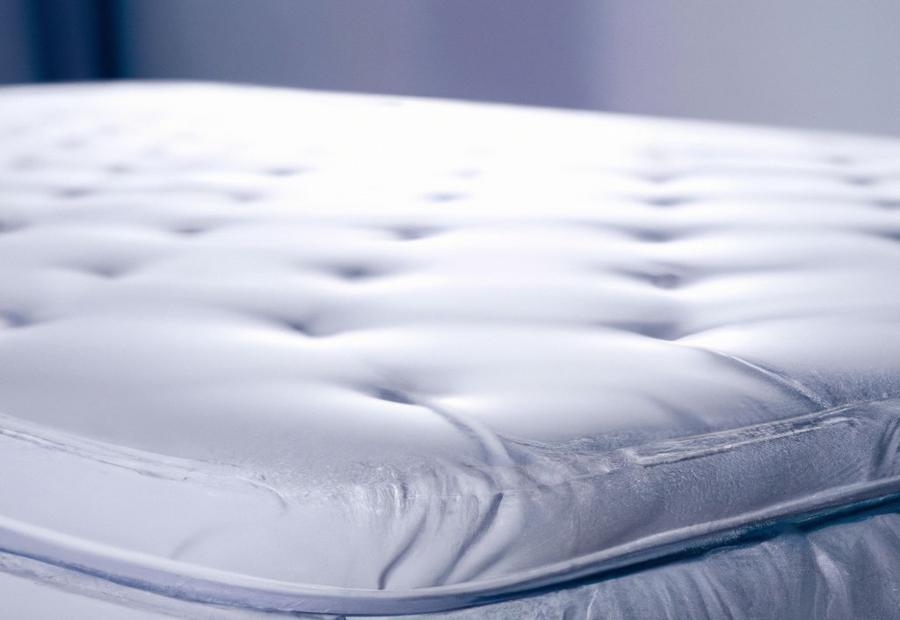
Photo Credits: Www.Mattressreviewguru.Com by Tyler Jones
Choosing the right mattress is crucial for optimizing your sleep quality. In this section, we will explore the importance of selecting the correct mattress and delve into understanding how the firmness of a mattress can impact your sleep. Get ready to uncover the key factors that should be considered when making this important decision, and how it can greatly affect your overall comfort and well-being.
Importance of choosing the right mattress
Choosing the right mattress is essential for quality sleep and well-being. The impact of mattress firmness on sleep cannot be ignored. Soft mattresses have their own set of characteristics and advantages, while firm ones offer different features.
Factors such as body weight, sleep positions, and spine health must be taken into account when choosing between soft and firm mattresses. Different sleeping positions require different levels of support. The right mattress can help promote quality sleep. It is vital to consider construction and material preferences, try out the mattress before buying, and understand warranty and financing options.
Comfort is subjective, but selecting the right mattress is key for a restful night’s sleep. Firmness of a mattress has a direct effect on sleeping quality. Soft mattresses provide a plush surface for better contouring and reducing pressure points. Firm mattresses provide strong support for proper spinal alignment.
Body weight affects the choice of mattress. Heavier people may benefit from firmer mattresses that offer more support and prevent sinking. Softer mattresses are more comfortable for lighter people as they allow better conformity to their bodies.
Sleep positions are also crucial in deciding the appropriate level of firmness in a mattress. Back sleepers need medium-firm to firm mattresses for proper spinal alignment. Side sleepers usually prefer softer mattresses that cushion hips and shoulders. Stomach sleepers need firmer mattresses to avoid excessive sinkage that could strain necks and spines.
When looking for the right mattress, it is best to try out different options. This allows individuals to personally assess the comfort and support of each mattress and make an informed choice based on their individual needs. Finding the perfect mattress involves considering various factors. By picking the right mattress, individuals can significantly improve their sleep quality and overall health.
Understanding the impact of mattress firmness on sleep quality
Firmness of a mattress is key for quality sleep. It has an effect on comfort and general well-being. It’s important to know the characteristics, pros and cons of soft and firm mattresses.
Soft mattresses give a plush feel and conform to the body’s shape, providing a gentle embrace. They’re great for people who like cushioning and have pressure points or joint pain. But, too much softness can cause sinkage and mess up spinal alignment.
Firm mattresses provide strong support and keep the spine in a neutral position. They’re great for those with back pain or need extra support. But, some may find them too rigid or uncomfortable due to limited contouring.
When choosing between soft or firm, consider weight. Heavier people might prefer firmer mattresses to prevent sinking. Lighter people may go for softer mattresses which provide more contouring.
Sleep position also matters. Back sleepers usually need medium-firm to firm mattresses for support. Side sleepers often go for soft to firm mattresses for pressure relief on hips and shoulders. Stomach sleepers usually need firmer mattresses to keep their spines aligned.
Spinal alignment is crucial for good posture and comfort during sleep. A too-soft mattress can make the spine sag, causing morning stiffness or back pain. But, a too-firm mattress might not fit the body’s curves.
Choosing the right mattress based on personal needs can improve sleep quality and overall health. Find the balance between softness and firmness that fits you. Don’t miss out on the chance to have better sleep!
What is a Soft Mattress?

Photo Credits: Www.Mattressreviewguru.Com by Brian Torres
A soft mattress offers a unique sleeping experience with its distinct characteristics and comes with its own set of advantages and disadvantages. Discover the comfort and plushness associated with a soft mattress as we explore its key features and delve into the pros and cons. Whether you’re considering a change or simply curious about the world of mattresses, this section will provide valuable insights into the realm of soft bedding.
Characteristics of a soft mattress
Soft mattresses are cozy and comfortable. Foam and springs of different densities create the plushness and cushioning effect. It sinks to the body, relieving pressure points and isolating motion, perfect for side or back sleepers. However, those with heavier body weight might not get enough support.
Breathability features also promote airflow and temperature regulation. Interesting research showed that medium-firm mattresses reduce lower back pain compared to firm ones.
Advantages and disadvantages of a soft mattress
Soft mattresses can provide comfort and pressure relief. They fit to the body, reducing stress on joints and providing cushioning. This could be helpful for those with chronic pain, or who want a plush surface. The mattress contours to the body’s curves, relieving muscle tension and preventing sores, and is ideal for side-sleepers.
On the other hand, it might not be suitable for everyone. It could lack support for heavier individuals or those with back issues. Also, couples could find that it doesn’t isolate motion, meaning one partner’s movements may disrupt the sleep of the other.
Not all mattresses are alike. Some like their sleep as firm as their jokes.
What is a Firm Mattress?

Photo Credits: Www.Mattressreviewguru.Com by Jonathan Martin
A firm mattress offers unique characteristics that can greatly impact your sleep quality. In this section, we will explore the distinct features of a firm mattress and discuss the advantages and disadvantages it brings. Understanding what makes a mattress firm can help you make an informed decision when choosing the right mattress for your specific needs. So, let’s dive into the world of firm mattresses and discover what they have to offer for a restful night’s sleep.
Characteristics of a firm mattress
A firm mattress is renowned for its characteristics that give a sturdy, supportive sleeping base. They are made to have very little give and are unlikely to sag over time. This firmness is due to construction and materials, which focus on providing optimal spinal alignment and pressure relief. A firm mattress can provide proper back support, but be aware – it’s like sleeping on the floor with a fancy cover!
Advantages and disadvantages of a firm mattress
A firm mattress offers pros and cons when it comes to sleep quality.
One advantage is that it gives great support for the body, especially for those with back pain or spine issues. The firm surface keeps the spine properly aligned, decreasing pressure points and discomfort during sleep. Plus, a firm mattress can prevent sagging or sinking in over time, offering long-lasting support and durability.
However, there are downsides to a firm mattress. Some people may find it too rigid and uncomfortable. It may not offer enough cushioning for side sleepers as it puts pressure on the hips and shoulders. Folks who suffer from joint pain or arthritis may find a softer mattress more soothing, as it allows more sinkage and contouring to the body.
Pro Tip: If you like a firmer mattress but need some extra cushioning, use a mattress topper specifically designed for added softness. This way, you can customize your sleep surface to meet your comfort needs and still get the support of a firm mattress.
Factors to Consider When Choosing Between a Soft and Firm Mattress
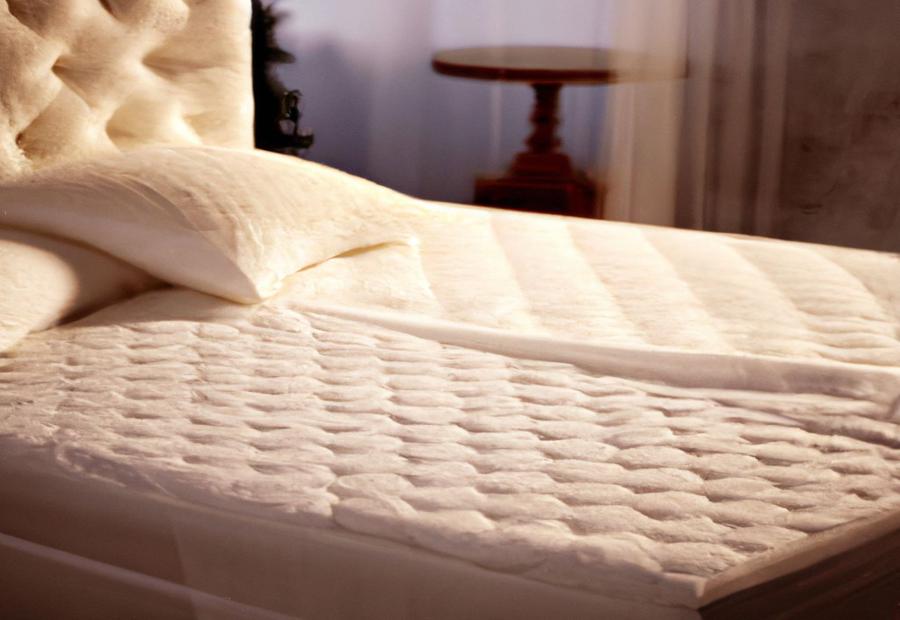
Photo Credits: Www.Mattressreviewguru.Com by Keith Lee
Choosing between a soft and firm mattress requires careful consideration of factors such as body weight, sleep positions, and spine health. Understanding how these aspects impact mattress firmness is key to making the right decision for a comfortable and supportive sleep surface. Let’s explore the relationship between these factors and mattress choice to ensure optimal rest and well-being.
Body weight and its impact on mattress firmness
Body weight is key to finding the ideal mattress firmness. Different body weights need different levels of support. This has a big effect on comfort and spine alignment during sleep.
Understanding how body weight impacts mattress firmness helps people choose the right one. Lighter people should go for softer mattresses. They contour and provide pressure relief, giving a comfortable sleeping surface.
Heavier individuals need firmer mattresses. This prevents sinking and gives proper support to the spine. It evens out weight and reduces stress on body parts like shoulders and hips.
It’s essential to find the right balance of comfort and support based on body weight. When selecting between soft or firm mattresses, body weight is important. It affects sleep quality and comfort throughout the night.
Choosing the perfect mattress is like finding the right dance partner. You need someone who knows your moves and supports you well.
Sleep positions and their compatibility with soft or firm mattresses
When picking a mattress, firmness is a key factor. It can really affect sleep quality, based on the individual’s sleep position.
For back sleepers, a soft mattress may not offer enough spine support, leading to pain or bad alignment. A firmer mattress can provide the needed support and keep the spine in line.
For side sleepers, a softer mattress can reduce tension on the hips and shoulders, allowing for better flow of blood. But, if too soft, it might not give the right support and misalign the spine. A medium-firm mattress can be a nice balance between comfort and support.
For stomach sleepers, a firm mattress is best, as it stops the hips from sinking too much. It also helps with the spine alignment and lessens lower back strain. Too firm though, might cause issues.
In the end, it comes down to personal preference when it comes to mattresses. General guidelines for sleep positions can be helpful, but comfort should be the deciding factor.
Spine health and the importance of proper support
When it comes to spine health, the right mattress support is key! Firm mattresses can promote neutral spine alignment, reducing strain and helping to prevent back problems. However, individual preferences and specific conditions should be taken into account.
Consider a mattress that distributes body weight evenly and provides lumbar support. Plus, personal comfort is important too! Soft mattresses may feel like sleeping on a cloud, while firm mattresses can be like trying to sleep on a rock. The importance of proper support for spine health cannot be overlooked – it contributes to overall sleep quality and can help avoid long-term issues.
Best Mattress Options for Different Sleeping Positions
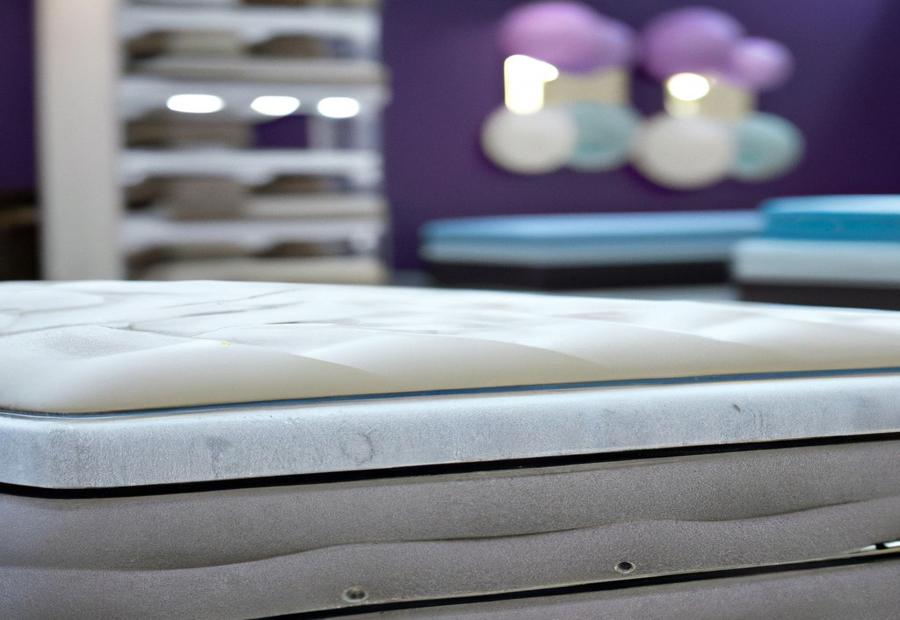
Photo Credits: Www.Mattressreviewguru.Com by Stephen Jones
When it comes to finding the best mattress for your sleeping position, understanding the differences between soft and firm mattresses is essential. In this section, we will explore the various options available for different sleeping positions. Discover the benefits and considerations of both soft and firm mattresses for back sleepers, side sleepers, and stomach sleepers. By the end, you’ll have a clearer understanding of which mattress type suits you best based on your preferred sleeping position.
Soft vs firm mattresses for back sleepers
Back sleepers must carefully select between a soft and firm mattress in order to achieve optimal comfort and support. A soft mattress can hug the body’s curves, minimizing pressure points and preserving alignment. On the contrary, a firm bed gives more resistance, providing better backing and averting sagging.
It’s noteworthy that individual preferences count and factors such as body weight and ease must be considered when deciding on a soft or firm mattress. In the end, discovering the perfect mix of comfort and support will boost an excellent night’s sleep for back sleepers.
Soft vs firm mattresses for side sleepers
Side sleepers need the perfect balance of comfort and support. The firmness of a mattress affects spine alignment and sleep quality. Soft mattresses offer pressure relief, improved circulation, better spine alignment, and are ideal for lighter people. Firm mattresses provide enhanced support, reduce motion transfer, relieve back pain, and are suitable for heavier individuals. Personal preference matters when choosing a mattress, so it’s best to try out different mattresses or consult a healthcare professional. The right firmness can help side sleepers get restful sleep.
Stomach sleepers face a difficult challenge when searching for the right mattress; soft or firm? Here’s some helpful info:
Soft vs firm mattresses for stomach sleepers
Stomach sleepers must choose between soft or firm mattresses for a comfortable slumber. Firmness affects spine alignment and helps avoid pain and unease. Soft beds contour to the body, easing pressure on hips and shoulders. But, they may not provide enough support, causing back pain. On the other hand, firm mattresses give more support, but can be too rigid and uncomfortable.
When selecting a mattress, consider body weight and personal tastes. Heavier individuals need more firmness to prevent sinking. The perfect balance of firmness and softness is key for stomach sleepers. Ask a healthcare professional or mattress expert for advice. A great mattress ensures a great sleep – just like a great mosquito net ensures a great camping trip.
Impact of Sleep Quality on Overall Health
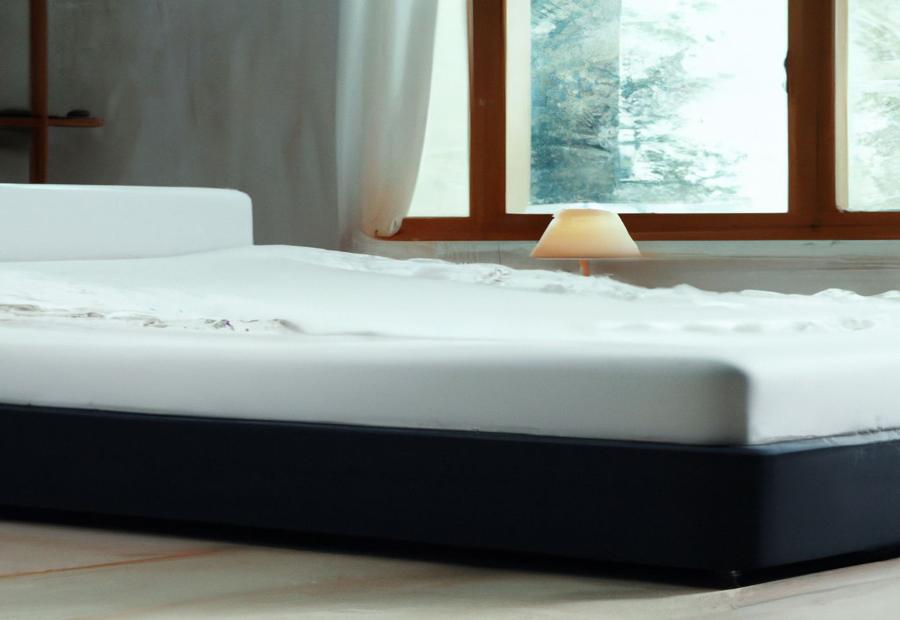
Photo Credits: Www.Mattressreviewguru.Com by Larry Clark
Achieving quality sleep is paramount for our overall health. In this section, we’ll delve into the impact of sleep quality on our well-being. We’ll explore the role that mattress firmness plays in promoting a good night’s rest, as well as how the choice between a soft or firm mattress can impact our sleep quality. So, let’s uncover the essential factors that influence the quality of our sleep and ultimately, our health.
The role of mattress firmness in promoting quality sleep
A mattress is key for quality sleep. Its firmness level affects how you sleep. The right firmness gives your body support and keeps your spine aligned. So, your sleep experience is improved. Plus, it can help reduce back pain and discomfort.
Firmness matters more than comfort. Too soft and it won’t provide the support needed. Too firm and it may cause pain or numbness. Finding the right balance is essential for optimal sleep and well-being.
Your body weight is an important factor when choosing a mattress. Heavier individuals need firmer ones so they don’t sink too deep. Lighter people prefer softer beds that contour to their shape.
Your sleeping position also makes a difference. Back sleepers need medium to medium-firm mattresses for support and conformability. Side sleepers need softer ones for cushioning and pressure relief. Stomach sleepers need firmer ones so their hips don’t sink.
The right mattress firmness is linked to better sleep and overall health. Body weight, sleeping position and any spinal/pressure concerns should be taken into account when deciding on soft or firm.
Pro Tip: Try out the mattress before buying. That way you can gauge if the firmness and feel is right for you.
How a soft or firm mattress can affect sleep quality
A mattress’s firmness can hugely affect sleep quality. Soft mattresses provide a plush, cushiony surface that contours to the body, relieving pressure points and promoting relaxation. Firm mattresses, on the other hand, offer a more stable and supportive surface; keeping the spine aligned and preventing sinking.
The type of mattress that is suitable for you depends on personal preference and health conditions. Soft mattresses may be more comfortable for people who suffer from joint or muscle pain, or those who prefer to sleep on their sides. But, too much softness can lead to the lack of support, causing misalignment and discomfort for back or stomach sleepers.
Firm mattresses provide the best support to maintain the spine alignment while sleeping. This is particularly good for back pain sufferers and stomach sleepers. But, some may find them too rigid or uncomfortable due to the lack of cushioning.
It is important to consider body weight, sleep position, and spinal health when selecting between a soft or firm mattress. Body weight affects how much sinkage occurs on a mattress, regardless of its firmness. Sleep positions also need different levels of support. And, for overall well-being, it is crucial to pick a mattress that supports the spine.
Picking the right mattress is like choosing the right partner – you want something that supports you, feels comfortable, and doesn’t keep you up all night.
Tips for Choosing the Right Mattress
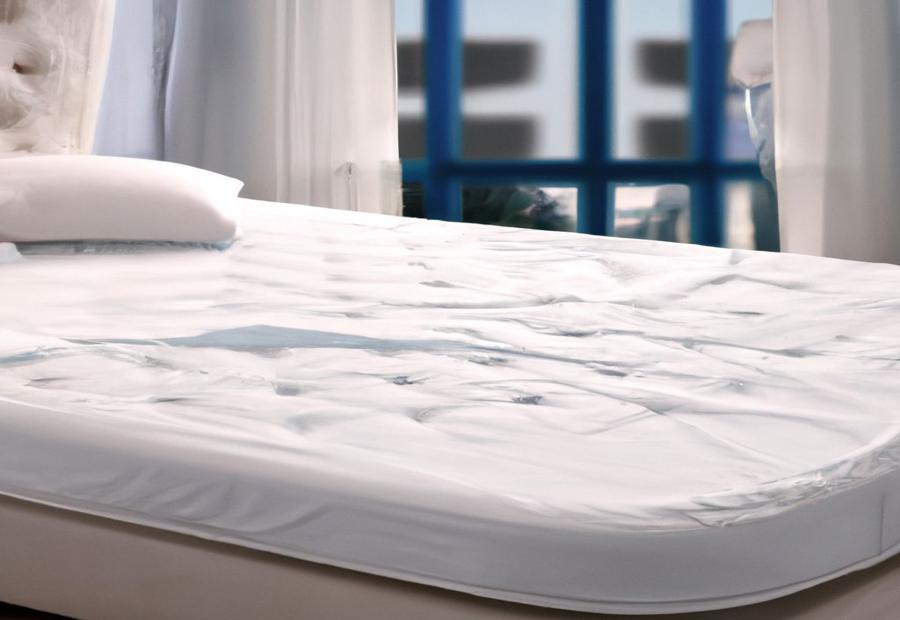
Photo Credits: Www.Mattressreviewguru.Com by Douglas Mitchell
When it comes to choosing the right mattress, there are a few tips that can help guide your decision. We’ll discuss considerations for mattress construction and material preferences, the importance of trying out the mattress before purchasing, and understanding mattress warranties and financing options. So, let’s dive into these key factors to help you make an informed choice for a good night’s sleep.
Considerations for mattress construction and material preferences
Construction and material are crucial for mattress comfort and support. When deciding, there are considerations for its construction and personal preferences.
- Construction: Look at the layers, materials, and design. Breathability, durability, and responsiveness will help you decide the best mattress construction. For example, high-quality foam or individual coils can give better support and motion isolation.
- Material Preferences: Different materials have different qualities. Memory foam offers pressure relief and contouring, and latex provides natural responsiveness and cooling. A hybrid could be the answer, combining the benefits of multiple materials.
- Environmental Impact: Think sustainability. Organic cotton covers or natural latex foams are eco-friendly choices. Certifications like CertiPUR-US make sure mattresses are free from harmful substances.
Firmness, construction, and materials all need to be considered when choosing a mattress. Breathability, durability, responsiveness, material preferences, and environmental impact also play a role in finding the right mattress.
Everyone is different. A guide to choosing the right mattress for combination sleepers might be good for one person, and latex or hybrid better for another. Thinking about construction and material preferences as well as your own needs will help you decide.
John, a side sleeper, was in pain from his old mattress. He invested in a new mattress with high-quality foam layers that provided excellent support. After a few weeks, John’s back pain was gone and he woke up feeling refreshed each morning. This shows how important considering construction and material preferences is for good sleep and health.
Importance of trying out the mattress before purchasing
Trying out a mattress prior to buying is a must for making a wise decision. It permits people to feel the ease and backup offered by the mattress first-hand, guaranteeing that it aligns with their particular needs and choices.
- Examining the mattress lets users evaluate its sturdiness and decide if it gives enough assistance for their body weight and sleeping posture.
- By attempting diverse mattresses, individuals can contrast the comfort levels and locate the one that suits them best, helping to guarantee a decent night’s sleep.
- Moreover, attempting a mattress before buying allows purchasers to recognize any potential uneasiness or issues that may emerge in the long run, such as pressure points or absence of support.
Purchasing a mattress without trying it out before could bring about dissatisfaction and disappointment if it doesn’t meet one’s comfort needs. By testing different mattresses in-person, clients can make a shrewd decision dependent on their own experiences instead of depending solely on product descriptions or online reviews. By taking the time to attempt a mattress before buying, individuals can increase their odds of discovering a comfortable and supportive choice that advances better sleep quality.
Understanding mattress warranties and financing options
Mattress warranties and financing are vital to consider when selecting the right mattress. Knowing the terms of a warranty can give assurance that you are protected if defects or damage occur. Familiarizing yourself with financing plans can let you pick a payment plan that works with your budget and preferences.
When buying a mattress, be sure to look into the warranty offered by the manufacturer. These generally cover manufacturing issues, such as faulty springs or sagging foam. Understanding the requirements of the warranty will ensure any problems with the mattress are addressed within an allotted time frame.
Financing is also necessary to ponder when buying a mattress. Many vendors provide payment plans to suit different budgets and financial situations. Exploring the financing options can make the purchase easier without impacting your wallet.
Bear in mind that not all mattresses come with warranties or financing. It is wise to research brands and vendors to find one that offers such benefits. It is also recommended to read customer reviews and feedback regarding warranties and financing before making a decision.
Conclusion

Photo Credits: Www.Mattressreviewguru.Com by Thomas Martin
Ultimately, the best mattress for you is subjective. Consider your body weight, sleeping position, and any existing health conditions when deciding between soft or firm. Both have their pros and cons. Soft mattresses provide a plush feel, but may not offer enough support for those with back or joint pain. Firm mattresses provide better support, but may feel too hard. For durability, firm mattresses usually last longer, as long as they are high-quality. Try out different levels of firmness in person to find the best mattress for you. If you have back or joint pain, talk to a healthcare professional for advice. Comfort and support are key for a restful sleep experience.
Some Facts About Which is Better Soft or Firm Mattress:
- ✅ Soft mattresses offer pressure relief for side sleepers, but may lack support and durability. (Source: Team Research)
- ✅ Firm mattresses evenly support body weight to prevent sinking and are more durable, preferred by stomach and back sleepers. (Source: Team Research)
- ✅ The ideal firmness level depends on sleep position, body type, and individual preferences. (Source: Team Research)
- ✅ Couples with different firmness preferences can consider a medium feel or a split mattress. (Source: Team Research)
- ✅ It is important to choose a mattress that aligns with your specific needs and preferences. (Source: Team Research)
FAQs about Which Is Better Soft Or Firm Mattress
Which is better, a soft or firm mattress?
When it comes to deciding between a soft and firm mattress, it ultimately depends on your personal preferences and sleep needs. Soft mattresses provide a plush and contouring feel, making them ideal for side sleepers and individuals with pain issues. On the other hand, firm mattresses offer stable support and are recommended for stomach and back sleepers. Ultimately, you should choose a mattress that aligns with your specific comfort and support requirements.
How is firmness measured when it comes to mattresses?
Firmness is typically measured on a scale of 1 to 10, with 1 being extremely soft and 10 being extra firm. Most mattresses fall between 4 and 7 on the firmness scale, which is the range that most people find comfortable. However, firmness is subjective and can vary based on factors such as body weight, size, and personal preferences.
What factors should I consider when choosing between a soft and firm mattress?
When deciding between a soft and firm mattress, several factors should be taken into consideration. These include your weight, sleep position, comfort preferences, any existing pain while sleeping, and whether or not you have a sleep partner with potentially different preferences. It’s important to understand your specific needs and preferences to choose a mattress that best suits you.
Can I compromise between a soft and firm mattress?
If you and your sleep partner have different preferences for mattress firmness, a compromise can be achieved. Consider opting for a medium firmness level, which is often the most versatile option. Additionally, using a mattress topper can add a layer of softness to a firmer mattress or provide some additional support to a softer mattress.
How can I make an informed decision when purchasing a new mattress?
To make an informed decision when purchasing a new mattress, it is recommended to do thorough research. Read reviews from reputable brands and websites, consider the type of support and comfort you require, and take advantage of sleep trials and mattress warranties offered by manufacturers. Testing out different options is key to finding the mattress that best suits your specific sleep needs.
Are there any benefits to both firm and soft mattresses?
Both firm and soft mattresses have their advantages. Firm mattresses provide stability and support, which can be beneficial for individuals with back pain or those who require a more rigid sleeping surface. Soft mattresses offer pressure relief and a plush feel, accommodating various sleep positions and providing comfort for individuals with pain issues. It ultimately comes down to personal preference and finding the right balance between comfort and support for your individual needs.






